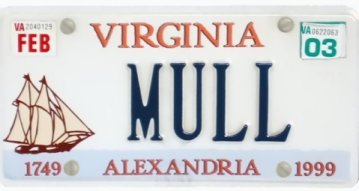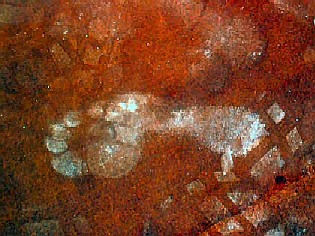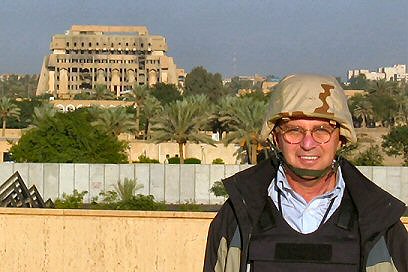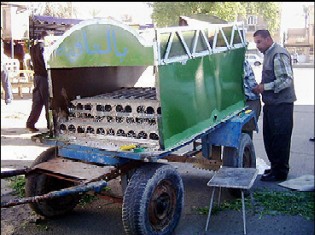Credit:
Adrian is a lawyer with the Department of Defense whose specialty is working with the governments of North Korea and the Vietnam trying to locate the remains of military personnel who are still listed as "Missing in Action." This is a very worthy effort, and Adrian is a very worthy guy.
I've never asked Cronauer if he really started his radio show with "Goooooood Morning, Vietnam" as Robin Williams does in the movie, but we will stipulate - for the next four months or so - that he did.
A former Member of Congress from Minnesota (a Democratic Member of Congress) and current friend and colleague named Gerry Sikorsky suggested the title of these Travelogues in an e-mail.
Both Cronauer and Sikorsky get full credit for the title. The content - for better or worse - is my responsibility. Chapter 5: The Reporters & The Donkeys
From The Green Zone
Sunday, November 23, 2003
It has been good sport to blame the lack of positive news coming out of Iraq on the reporters who are here filing those negative stories.
Like most things in life - and like just about everything here - there is some truth to that, but there are more factors.
Civilians like me live in what you now know is called "The Green Zone." Interestingly, in a military-dominated atmosphere where acronyms are the currency of every-day speech The Green Zone is called, "The Green Zone."
Not the "GZ" which I would have thought to be a natural. It's short, it rhymes and, for English speakers, the two letters are easily pronounced in that order.
Try it.
See?
Nevertheless, reporters do not live in The Green Zone. They live in hotels and houses which provide them with the Iraqi version of a permanent residence.
In order to get into The Green Zone reporters have to undergo the same scrutiny of any other non-cleared person - people like me. Once inside The Green Zone they cannot walk around past the convention center.
The convention center is where the daily briefings are held and where, in a couple of weeks, a media work space will be finished and ready for any reporters - Western or Arabic - to use as their regular offices, much as the House and Senate press galleries; or the White House briefing room.
SIDEBAR:
No big deal there. Except every morning the wallboard guy comes in, strips down to his boxer shorts, and goes to work.
At the end of the day, he puts his clothes back on, and leaves.
I don't have a photo of him, but I have the evidence of his being there by virtue of this evidence left on the carpet the other day:
I may not be a qualified tracker, but I can tell whether someone, having walked in plaster dust, is wearing shoes or not. END SIDEBAR:
Still, for reporters, it is easier to cover the Iraqi side of the equation than the Coalition Provisional Authority (CPA) part of the equation. This is largely because of a lack of bodies on the CPA side.
There are some very real issues for reporters. There is the personal safety issue. You have to be daft to ignore that. But there is also another big issue for reporters - there is a very, very limited phone system in Baghdad.
The usual way of contacting a reporter here is to call a number which might be a 212 number (New York City) or a 202 number (Washington, DC) or a +44 number (the U.K.) and the phone, through some magic of technology, rings in Baghdad.
The result is, a signal bounces from my desk to New York to a reporter's workspace perhaps two miles away which causes a long delay between question and answer.
Some reporters have been here since day one. A reporter for one major newspaper has been here - literally - since the day after Saddam's statue came down.
But that is not the norm. More often, reporters - print and broadcast - cycle in and out sometimes for a few days or weeks; sometimes for a month.
It is axiomatic of the process that reporters (and people who write columns on the internet called "Mullings") have a tendency to parachute into a situation, talk to a few people (often other journalists) and then report what's really going on here.
We have discussed this before, but it bears repeating: If you read some report which says somewhere, "Observers here say �" you are reading the report of a journalist who was sitting at the bar talking to other journalists.
Because Baghdad is where the CPA headquarters is located, it is where the Western news organizations are located. Baghdad is the capital of Iraq so as the Ministries are beginning to, as the State Department folks like to put it, "stand up" it makes sense to cover those activities.
The ministry buildings are out in the city so reporters have access to the buildings. The Governing Council is within The Green Zone, so reporters have the ingress and egress issues described above.
Here, for example is a photo of Iraq Rich with the former Ministry of Information - the home of Baghdad Bob - in the background.
Reporters are often like cops: If they see enough crime and corruption they tend to believe that everyone is guilty of something and assuming you call into the "everyone" category you must be, too.
The bad guys - that has become the shorthand that everyone uses to describe the terrorists - understand the use of the media. As an example,
Donkey carts in Baghdad are what we would call ubiquitous if (a) we knew what ubiquitous meant and (b) we could spell it without Microsoft's help.
I don't know about their ubiquity, but I do know they're just about everywhere.
Dear Mr. Mullings. You have beat that "ubiquitous" horse - donkey - long enough. Please get off it - literally and figuratively.
Anyway the bad guys put rocket launchers on these donkey carts then somehow disguised that as a generator and walked them near the Palestine Hotel (home to CNN), the Sheraton Hotel (home to Fox) and the Ministry of Oil building (which, as this was a Friday morning, had no employees inside. Friday, remember, is the Sabbath here).
Some observers here say that they were only aiming at the Palestine Hotel, but some of the rockets went astray and hit the Sheraton by mistake.
Dear Mr. Mullings. Didn't you just warn us about that "observers here" business?
Yes, but my observers are wearing Coalition uniforms.
A rocket attack is nothing to sneer at. It's loud and the shrapnel can be deadly. The bad guys used donkey carts because they hadn't been used before. There were two additional carts found by Coalition soldier before the rockets could be detonated.
When I asked how they had been found, I was told "once we realized what was going on, we had soldiers out looking for them."
I suspect the reason those rockets aimed at the Palestine Hotel went astray was because the donkey attached to the cart bolted when they started firing.
MEMO TO BAD GUYS: In future, when firing rockets from a donkey cart, first disconnect the donkey!
At the press briefing that night just about every question dealt with the donkey carts. So much so that there was an after-briefing gaggle to talk about them some more.
There was no chance of talking about electricity or water or fuel supplies; nor about the banking system beginning to come back to life; nor the tens of thousands of Iraqis who are now guarding their own infrastructure.
It was all donkeys all the time.
The donkeys, by the way, were "shaken" but largely unharmed. After a short period of time the unit which had taken them into custody handed them out to Iraqis who needed them and would care for them.
So, you can't blame the press corps. The bad guys planned this attack to have the greatest publicity impact; even though, according to the military folks, the attacks were tactically insignificant.
I hope this helps you see the difficulties everyone has in getting the story from Iraq out.
It is not all the reporters' fault. As I wrote at the top: There are a lot of factors.
Be safe.
More next week.
Click here to return to the Mullings page



"Good Morning Vietnam," you remember, was a movie about an airman/disc-jockey named Adrian Cronauer. Adrian Cronauer is a real person who is an acquaintance and occassional lunch-date of mine. He does not look like Robin Williams. He looks, by his own description, like Robert Bork.
Baghdad, Iraq
One of the interesting things about working here is watching how others do their jobs. Nothing is easy; and nothing happens quickly. In the construction of this media work space the contractor, an Iraqi, has a guy working for him who installs the wallboard.


MEMO TO SUSAN ESTRICH: Wanna run my campaign for President?
Signed, PETA
Signed, William Strunk, Jr. & E.B. White

(Photo: AFP/Ahmad Fadaam)